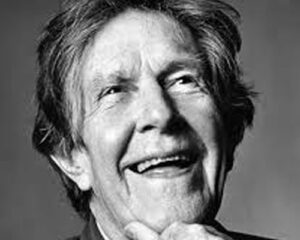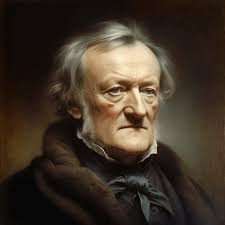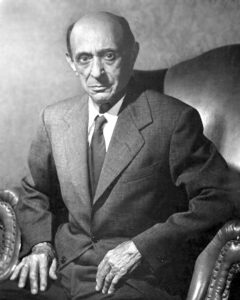On Monday July 26, 1976 I called John Cage and asked to see him. He agreed and on Thursday July 29, 1976 we met for the first time.
I showed him my first piece, something I had written for John McLaughlin, the first guitar player that Miles Davis ever used (Bitches Brew). I had an in with Shelley Schultz of International Creative Management who booked McLaughlin. It was a screaming fast jazz-rock piece that was so in style at the time, but it's melody was intervallic, via Schoenberg, who was Cage's own greatest teacher and it caught his ear. I'll never forget that curiously surprised look of respect on his face. I felt like a million dollars. Here was the greatest composer on earth respecting my work...We had another drink.
 John McLaughlin at his peak
John McLaughlin at his peak
 Miles Davis reaching for his
Miles Davis reaching for his
John Cage was a very graceful man. He had a little boyish smile that would slyly light up his face when he thought he was getting away with something that he thought you weren't wise enough to understand yet. A look I would learn to recognize quickly and often.The next piece I would show him, below entitled “George Eliot is Beautiful, Part 3, for Bass Flute”, was also “fusion”, but with an even more dissonant and widely angular intervallic melody.
Once again, there was the look of respect and recognition. I've got to say that, after being present at the birth of my daughter, it was the most thrilling moment of my entire life. He could see past the transiently stupid jazz/rock harmonies and silly imperfect meter of the day and he could hear my melodies. I was in!... we had another drink.

I knew, when I first walked in Cage's front door to his loft, and a man who looked more like a heating and cooling installer from Des Moines, than the greatest intellectual Titan the music world had seen since Richard Wagner and before that Beethoven himself, that this was the most intelligent person I had ever met and probably would ever meet. Cage wasn't humble. He was meek...but extremely, extremely strong. To face the world with 4'33'' and essentially say "I know what I'm talking about, and you don't, and even if you abuse me for it, I will still love you by continuing to do it", took staggering strength.

I showed him Fais Voile, a Debussyian harmonic exploration, (retitled here below as " George Eliot is Beautiful, Part 1, for Bass Flute”). I watched his face. It was almost perfectly motionless.

Arnold Schoenberg had revolted against the bloated post-Wagnerian romantic excesses of his time. Cage revolted, musically, against the 'expressionism' of Schoenberg's intensely brilliant, angularly melodic, contrapuntal intellectualism.
 Wagner
Wagner
 Schoenberg
Schoenberg